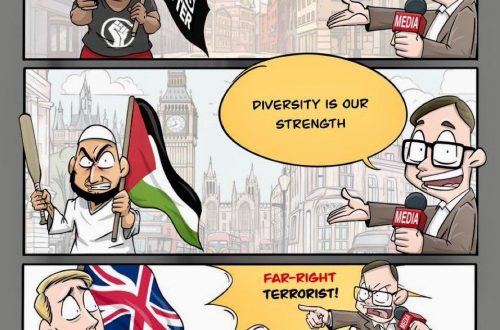Some readers concerned about free speech may have found the arguments put forward here by Geoffrey Alderman, in favour of freedom of expression even for non-violent extremists, persuasive:
The criterion for inclusion in the list would be the holding and promoting of non-violent extremist views (violent extremism being already banned). So, quite naturally, my fellow dons and I have been asking ourselves what constitutes an ‘extremist’ view. After all, one man’s extremist is another man’s purveyor of common sense. And, in any case, ‘freedom of speech within the law’ means nothing if it does not encompass the freedom to articulate very unpopular views and if it does not uphold, unequivocally, the right to give offence.
By contrast the Muslim Action Forum wants to silence those who go too far. They propose that:
a. Desecration of human dignity through insult, denigration and humiliation is ethically and morally wrong
b. Passionate emotions must be harnessed and channelled through good manners and etiquettes to civilise any debate in our diverse society
c. Reckless and malicious expressions leading to demonization and vilification must be restrained
In fact their only concern is to proscribe caricatures of Mohammed. But the same arguments, with very slight adjustments, could be used to outlaw many of the views and expressions associated with hate preachers.
Bringing the two cases together heightens the absurdity of the MAF’s demands. While they have to make a case that cartoons ‘lead to’ demonisation and vilification of Muslims, many groups – particularly, but not only, LGBT people and apostates – are not simply directly demonised and vilified by speakers such as Haitham al-Haddad, but told they deserve death.
Here’s the full context for that last quote from MAF:
We would like for you to lobby your MP and all Political Party candidates standing for general election on 7th May 2015 and ask the following three questions:
1. Do you think that the Public Order Act 1986 should be amended to include under ‘hate crime’ any malicious depiction of images and use of malevolent language against revered personalities of all religions?
2. Do you think that Islamophobia should be a culpable offence?
3. Would you support a Bill of Rights that promotes the idea of Global Civility, including the ideas that:
a. Desecration of human dignity through insult, denigration and humiliation is ethically and morally wrong
b. Passionate emotions must be harnessed and channelled through good manners and etiquettes to civilise any debate in our diverse society
c. Reckless and malicious expressions leading to demonization and vilification must be restrained
They make some pretty big assumptions about which issues are of most concern to British Muslims.
Saying no to any one of the three questions above will clarify to the local Muslim community where their political representatives stand on the single most important issue to every Muslim in this country and worldwide.
Here’s a response from Stephen Evans of the National Secular Society:
“We trust all prospective MPs will appreciate that there is no homogeneous ‘Muslim community’ and reject such unreasonable demands to undermine everybody’s fundamental rights and freedoms. Free speech is the bedrock of liberty and a free society – and integral to combating the spectre of Islamism. Now more than ever we need to preserve and strengthen freedom of expression, not capitulate to extremist demands.”

